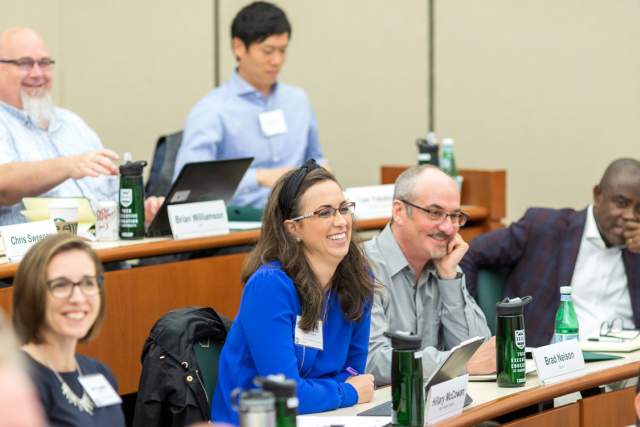Since its founding in 1900, the Tuck School of Business has stood apart from its peers in its steadfast commitment to providing the highest quality residential education for MBA students, executives, and aspiring professionals. Today, Tuck Executive Education is building upon that foundation with the launch of a series of online executive education courses offered through the platforms Coursera and ExecOnline.
Two of these courses are available now: Strategic Leadership: Impact, Change, and Decision Making for Work and Life (a “specialization” composed of four courses on Coursera), taught by Sydney Finkelstein, the Steven Roth Professor of Management; and Strategic Communication, taught by Paul Argenti, professor of corporate communication on ExecOnline.
This is not Tuck’s first foray into online education—the school has offered courses through EdX and Emeritus since 2016—but this step represents a new direction and priority for Tuck, as it seeks to bring a wider range of thought leadership to a broader audience around the globe.
“In today’s environment, there’s more interest in online education than ever,” says Kevin Lane Keller, the E.B. Osborn Professor of Marketing and former senior associate dean for marketing and communications, who led the development of these online programs until this past January. “We have something high quality and unique to offer, in the form of our renowned Tuck faculty, so we want to leverage that in a compelling and impactful way on these different platforms.”
Tuck Executive Education chose to work with Coursera and ExecOnline for their deep experience in developing state-of-the-art content and curricula and bringing it to their respective audiences. Coursera is open to all learners around the world and features business courses from more than 250 leading universities and companies. ExecOnline, meanwhile, is a business-to-business company that licenses executive education courses to firms for their employees’ professional development.
Coursera already offers two online courses from Dartmouth College—Energy Justice: Fostering More Equitable Energy Futures; and Digital Transformation, a course developed with the Thayer School of Engineering—and will launch a course on full stack web development later this year. Dartmouth developed the in-house capability to produce those online courses, so Tuck partnered with the College to produce its online executive education offerings.
Our online programs allow us to share valuable faculty insights and concepts with new audiences who might not have the privilege to be here in person, from people who are just interested in business to those in leadership roles in organizations.
“This has been a phenomenal collaboration between Dartmouth and Tuck,” says Joseph Gerakos D’90, professor of business administration and senior associate dean for innovation and growth. “We wouldn’t have been able to do this if it weren’t for the fabulous work on the part of Josh Kim (director of Online Programs and Strategy), Mitchel Davis (vice president of Information, Technology and Consulting), and Erin DeSilva (assistant director of Learning Design and Technology).
When Tuck Executive Education was considering this move into online courses, the leaders in the department thought deeply about how the courses would fit in with the traditional residential programs Tuck has delivered to executives for decades. They concluded that the two types of programs are very different in terms of the format and audience. Residential programs, such as Leadership and Strategic Impact, are integrated experiences where multiple faculty teach in-person to learning cohorts. By contrast, the online courses are asynchronous and aimed at individuals.
“These are purpose-built for online,” says Phil Barta, the executive director of Tuck Executive Education, “and they allow us to share valuable faculty insights and concepts with new audiences who might not have the privilege to be here in person, from people who are just interested in business to those in leadership roles in organizations.”
The breadth of that online audience is evident in Finkelstein’s specialization on strategic leadership. It’s composed of four courses, each a month long, that tie together his research and teaching during the past three-plus decades, and it promises to help learners “build the wisdom and skills you need to grow and change as a leader—and as a person.” To create the specialization, Finkelstein gleaned insights from his books Why Smart Executives Fail, Think Again, and Superbosses, and lessons from the role he’s played as a mentor and teacher to thousands of Tuck MBA students over the years.
“In every case I talk about, I purposely created connections between business and everyday life,” he says. “For example, companies think about value in many different ways, and that’s something we can apply to our own careers and capabilities.” The first three courses were filmed at Dartmouth’s online learning studio, but the fourth was filmed mostly at Finkelstein’s house—in his kitchen, his office, and on his deck—to impart the more casual feeling one might get from meeting with a mentor over coffee. “It’s in keeping with the personal nature of the course,” he says. “It’s really me talking and sharing ideas that I’m confident have been highly impactful for people.”
In each course, it’s all about being able to take faculty thought leadership and translate it into impact.
In addition to the 120 videos Finkelstein recorded, each of which is four to 12 minutes, he also created roughly 70 practical exercises that help learners use the lessons in their own life. The exercises are not something he’s presented in the MBA classroom, but now he’s planning to use them there. “It’s an interesting synergy I didn’t anticipate when I started,” he says.
For Gerakos, that synergy is one of the central reasons Tuck is expanding into the online world. “We’re using this as a way to innovate,” he says. “It’s allowing faculty to get out of their comfort zone and learn different things they can apply in the MBA program. I think that’s a huge benefit.”
Even for Argenti, who has been teaching online for 10 years in various programs, working with ExecOnline was a learning experience. His course covers communicating for influence, organizational alignment, and strategy—all areas he teaches in his MBA course Corporate Communication. But while the content was familiar, the format and delivery were not. In part, that’s because of ExecOnline’s propriety approach, the Applied Experience Platform, where participants complete real-world projects that have a direct, tangible impact on their organization. But it was also because ExecOnline works closely with presenters to hone the videos and programs into experiences tailor-made for executives.
“The development process for this was one of the most intense experiences I’ve had as a teacher in the last decade,” he says. “The team at ExecOnline is one of the most professional groups of people I’ve ever worked with, and they asked me questions that really made me think about my own material and what I teach.” That preparation paid dividends for Argenti this winter, while he was teaching Corporate Communication in the MBA core curriculum, as he used new examples to teach concepts.
Looking ahead, Argenti is excited to create more online courses that can expand his reach beyond Tuck. ExecOnline and Coursera have the audiences to make that happen. “There’s no other place where you can get that kind of access into corporations and get people excited about the material,” he says of ExecOnline. “We need to do more of this as a school, and any way I can help I will.”
In addition to the courses offered by Argenti and Finkelstein, Tuck Executive Education is working on a course on Strategic Innovation with Ron Adner, the Nathaniel D’1906 and Martha E. Leverone Memorial Professor of Business Administration, and developing ideas for a course for women of color, with Ella L.J. Bell Smith, professor of business administration.
“In each course, it’s all about being able to take faculty thought leadership and translate it into impact through specializations and applied experiences,” says Barta. “It fits very well with the Tuck brand.”

